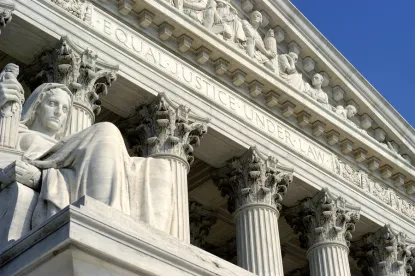Yesterday, the U.S. Supreme Court heard oral argument in Facebook v. Duguid—a significant case potentially limiting the reach of the Telephone Consumer Protection Act (“TCPA”). Facebook will resolve a circuit split over what qualifies as an automatic telephone dialing system (“ATDS”) under the TCPA.
The TCPA makes it unlawful to call a wireless phone using an ATDS, unless the called party has consented to receive such calls. The statute defines an ATDS as “equipment which has the capacity—(A) to store or produce telephone numbers to be called, using a random or sequential number generator; and (B) to dial such numbers.” 47 U.S.C. § 227(a)(1). The question presented in Facebook is whether this statutory definition requires that the equipment use a random or sequential number generator to both “store” and “produce” telephone numbers.
Famous grammar expert and lawyer Bryan Garner argued the plaintiff’s position. He asserted the phrase “using a random or sequential number generator” modifies only the verb “to produce,” but not the verb “to store” in the definition based on principles of grammar and statutory construction. Under this theory, the ATDS definition covers systems that store or produce numbers to be dialed automatically. Plaintiff also asserted that Facebook’s interpretation would destroy consumers’ privacy, drastically limit the TCPA’s scope, and allow the deluge of unwanted robocalls to continue because the TCPA will exclude systems that automatically dial stored numbers but do not employ number generators to store them – which encompasses most systems.
Facebook’s attorney, former Solicitor General Paul Clement, argued that under ordinary rules of grammar and canons of construction, the phrase “using a random or sequential number generator” cannot be decoupled from the verb “store” but instead modifies both “store” and “produce.” Facebook warned that Plaintiff’s interpretation converts a statute designed to target the specialized technologies of telemarketers that posed distinct risks of tying up emergency numbers or business lines into one that penalizes wrong numbers from nearly everyone who places a phone call.
The Department of Justice notably intervened in the dispute in favor of Facebook and adopted a similar position. DOJ’s Jonathan Ellis featured prominently in the oral argument, primarily focusing on grammatical rules. The government’s weighing in on Facebook’s side may well provide additional reasons for the Court to rule in Facebook’s favor.
At the argument, the Justices focused equally on statutory interpretation principles and grammatical rules as they did the practical impact their ruling will have. Justice Sotomayor seemed particularly concerned about the potential for Plaintiff’s position to cause the statute to cover ordinary cell phones, and probed about whether that would really happen if they adopted Plaintiff’s interpretation. The Plaintiff asserted it would not because ordinary cell phone users generally do not enable their phones to automatically dial numbers in mass, especially to people who would not consent to their call. Justice Thomas also questioned the applicability the statute, adopted in 1991, to today’s technology, and Justice Alito wondered out-loud whether the statute is obsolete. With at least one liberal member of the Court (Justice Kagan) questioning Plaintiff’s position, Facebook’s position may well be the one that prevails.
The Facebook decision—likely to be released in the Spring of 2021—will expand, limit, or at the very least clarify the TCPA’s scope across the country. That said, the decision’s practical impact also may not be a complete game-changer for TCPA compliance long-term. Even if the Supreme Court limits what qualifies as an ATDS, new technologies and communications tools continue to develop and companies still will need to remain mindful their telemarketing practices comply with the TCPA and related state statutes. Moreover, the Facebook decision likely will not impact the TCPA’s regulation of a segment of calls the statute targets: calls using artificial or prerecorded voices.





 />i
/>i

